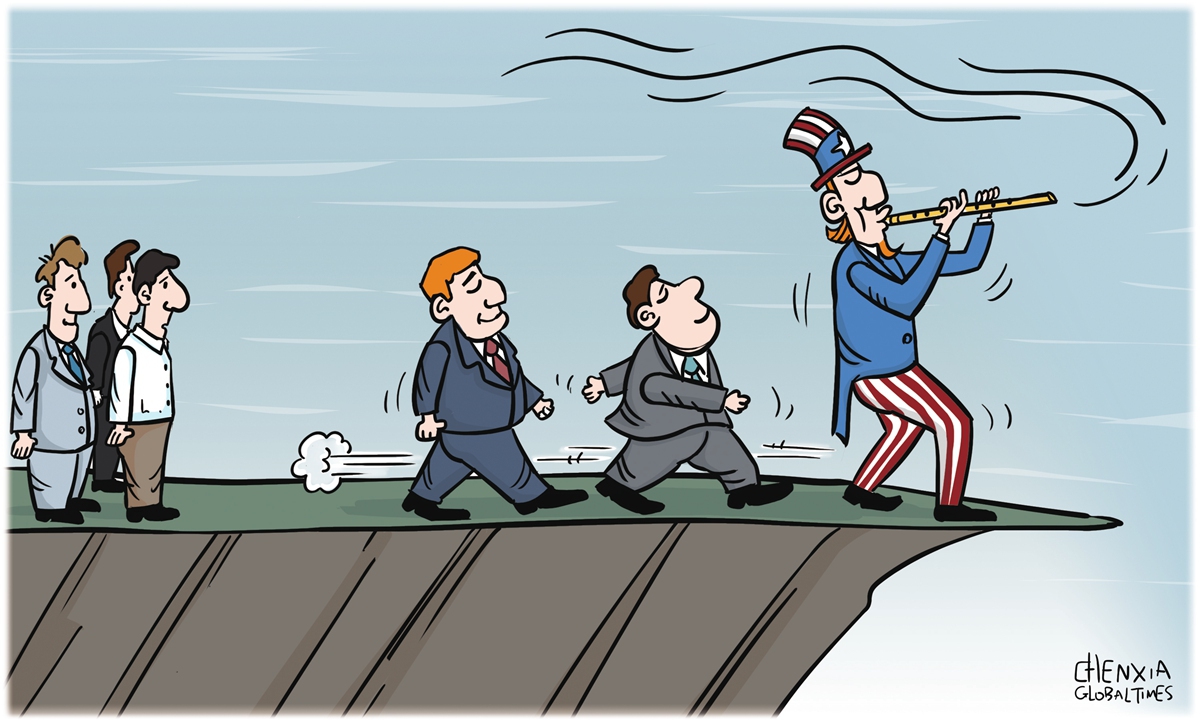
Illustration: Chen Xia/GT
Recently, the Diplomat magazine published an article titled "Are US Allies Falling out of 'Alignment' on China?" The author of the article claims that the CHIPS and Science Act and the Inflation Reduction Act (IRA), both of which Washington regards as major domestic achievements, have raised concerns among US allies because they unfairly favor US firms over foreign counterparts. Given this, the fact that the US alliance system has become unsustainable under "America First" conditions is becoming more and more apparent.
Following Donald Trump's four years in power, the US alliance system has suffered a devastating blow. Joe Biden has continuously emphasized the importance of allies to the US since he took office, precisely because alliances are one of the most strategically valuable tools in US diplomacy. But if Washington wants to continue using alliances to satisfy its interests, it has to shape enemies around the world. In Europe, it has made Russia an enemy, and in the Asia-Pacific region, it is framing China as an enemy. By constantly hyping up the so-called Russia and China threat theories, the US aims to strengthen its alliance system. In particular, by creating a series of crises and exaggerating a divided world, it can push forward confrontation and reap benefits.
However, Washington only has its own interests in mind now and the nature of US alliances has changed.
In the past, the US was able to advance its alliances due to a "transactional logic" in its relationship with its allies, that is, allies who follow Washington can obtain benefits that they would not otherwise be able to obtain elsewhere or on their own. In other words, there is connection between whether an ally is a symbol of positive US influence, or a tool to serve US national interests. This enables the continuation and consolidation of the relationship between the US and its allies.
But now, Washington's actions increasingly do not benefit allies anymore but attempt to make them willingly serve the US directly by harming their own interests in the process. As a result, the nature of US alliances have undergone a fundamental change. Washington's new model of not giving allies anything in return but sacrificing allies' needs is increasingly difficult for allies to accept, and it can even be said to be jaw-dropping. It has sacrificed not only the economic interests, but also the strategic interests and future development of other countries for the sake of benefiting itself.
Treating its allies in this way certainly stirs up a great deal of controversy. Both Asia-Pacific and European allies have increasingly expressed their displeasure. One South Korean official called the IRA a "betrayal," especially after South Korean companies had pledged to invest billions of dollars in the US. Even French President Emmanuel Macron warned that the choices that will rip apart the West, because they create such differences between the US and Europe.
Despite the complaints and grievances of its allies, Washington seems to have no time for them. It can only brazenly maintain the fragile alliance in the name of confronting the "common enemy" and continue to reap the benefits of its allies to satisfy its own needs. In the process, the fundamental interests of the allies will actually be further damaged. As Henry Kissinger once quipped, "It may be dangerous to be America's enemy, but to be America's friend is fatal."
Shen Yi, a professor at the School of International Relations and Public Affairs of Fudan University, told the Global Times that it also reflects the trend that the US is in decline. The US today has reached a stage where it needs to harvest the interests of its allies in order to satisfy its own interests. It can no longer maintain a state where the allies can freely obtain more benefits from being in alliance with the US.
It must be emphasized that if the US continues to sacrifice the needs of its allies in order to satisfy its own selfish interests, many problems and deep differences will arise in future cooperation between it and its allies. Whether it is ASEAN countries, or US allies in Europe, they all prefer that the world needs more cooperation than division, a Beijing-based expert pointed out.
The current foreign policy behavior of the US is becoming more and more dangerous. If Washington does not act cautiously and consider the needs of other countries in its foreign policy from the perspective of truly mutually beneficial cooperation, its alliance system will only end up in internal disorder and fall apart.
The author is a reporter with the Global Times. opinion@globaltimes.com.cn




